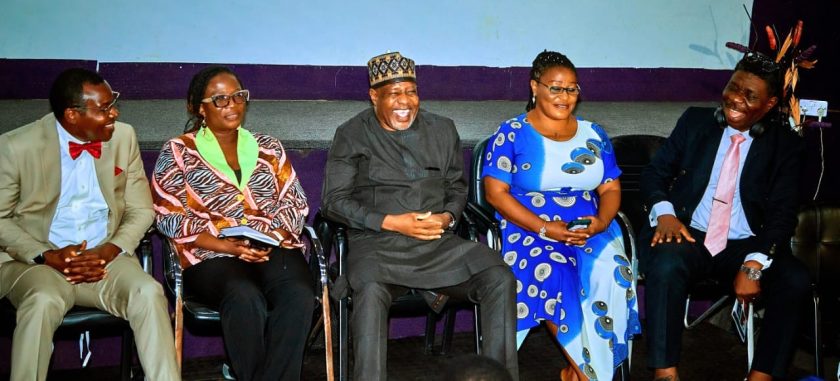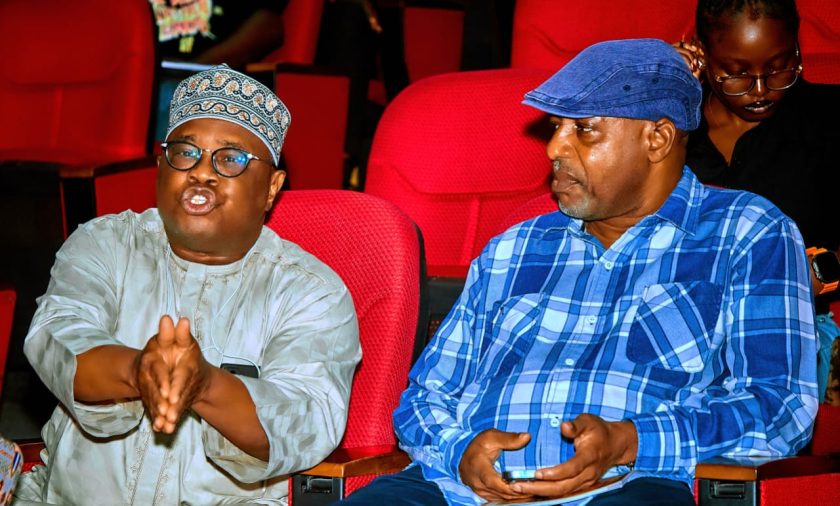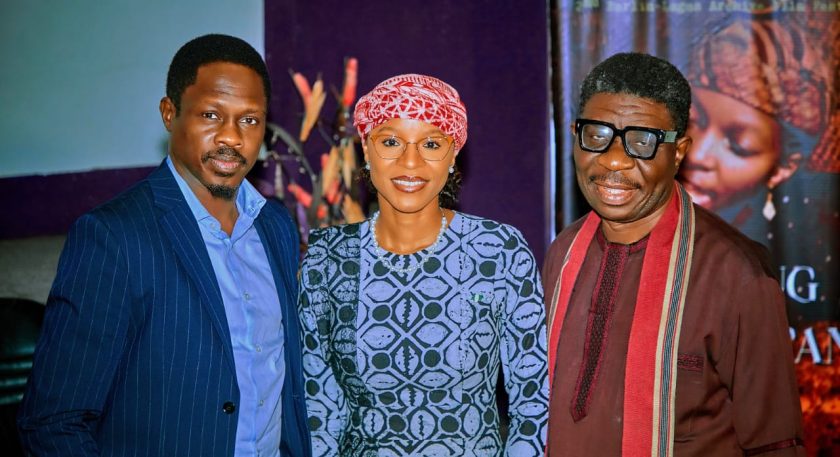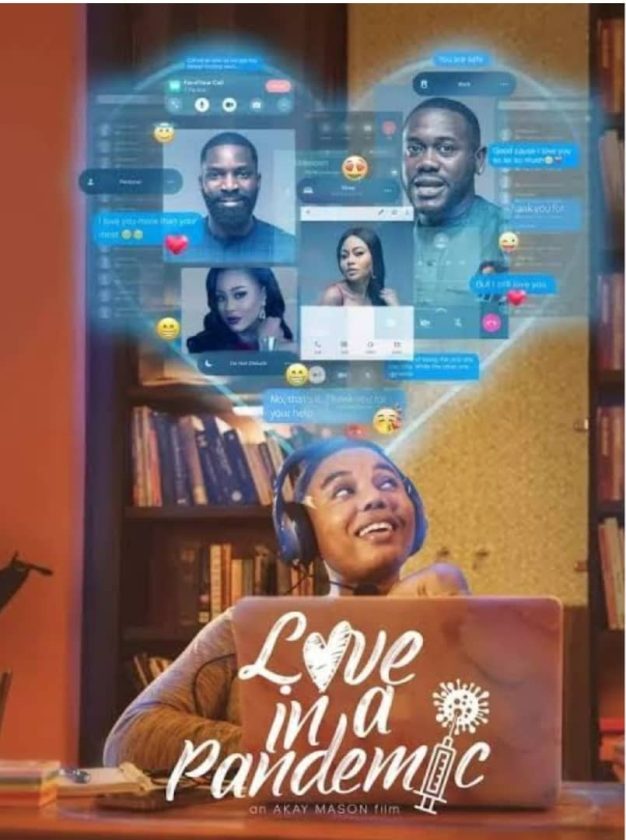*L-R Dr. Ali Nuhu, MD, NFC, Dr. Muktar Yawale Perm. Sec. FMACTCE, Aisha Augie DG, CBAAC and Dr. Shuaibu Husseini DG, NFVCB
By Brian Etuk
Decasia 2025, a premier audio-visual heritage film event 2025 ended on good note. The conversations were tensed, exciting, revealing and assuring. Striking discussion topics of great national importance and daily vintage feature and documentary film screenings held participants spell bound during the four-day event (July 27th – 30th 2025) held at the Cineplex of the Lagos office of the Nigerian Film Corporation (NFC).

Outcome of discussions centered on the future of Nigeria’s film industry known as Nollywood, undisputedly a dominant and representative cinema of Africa,
globally; among other critical audio-visual production value chain, especially from the point of preservation and archiving pointed to one direction – the need to protect the product and preserve
its content.


The imperatives of audio-visual archiving and improved practices were never missing. Neither was the consensus for some more, intentionally motivated actions to promote their seamless re-use,
access, public exhibition and copyrights neglected. In fact, renewed hope including commitments by film industry professionals, the academia, film regulatory agencies for the institutionalization of formal policy frameworks was vigorously craved for and adopted. While audio-visual archiving and preservation remains a global phenomenon, how it affects Africa and particularly Nigeria’s audiovisual industry were subject of intense debates.
From the well-crafted “The Profession of the African Archivist”, “Archival Pasts and Digital Future”, “Treasures From the National Film Video & Sound Archives”, “Post Memory-Post Archive”, “Why Film History Matters for the Future of Cinema” to “Losing Nollywood” as penal
discussion topics, the film festival witnessed a pool of the very best of film industry experts and scholars from Nigeria and across Africa and Europe, including Nigeria’s Art, Culture, Tourism and Creative Economy Minister, Barr. Hannatu Musawa, who was represented by the Ministry’s Permanent Secretary Dr. Muktar Yawale MFR, mni. NFC’s Chief Executive Dr. Ali Nuhu, NFVCB
Executive Director Dr. Shuaibu Husseini, the Director General of CBAAC Aisha Augie, Otunba Ajiboye – Executive Secretary of NICO, Dr. Obi Asika NCAC Director General, represented by its
Lagos State Zonal Director Princess Ivie Betty Uwa-Igbinoba as well as the Director General of the National Theatre, Lagos Mrs Tola Akerele.
Faculty contributions to what can be described as knotty, but storms in the way, inhibiting the effective management of archives will surely resonate as the unleashing of Africa’s archive continues to receive the attention and traction it deserves. Domestic and offshore experts’ views potently provided new and innovative insights that will enable African archives perform at their optimal.
There was also contributions by the likes Mr. Brendan Shehu, pioneer NFC Managing Director Mr. Femi Odugbemi, Dr. Victor Okhai, Dr. Ahmed Sarari, Professors Femi Shaka and Abdallah Uba Adamu – renowned film critic and former NOUN Vice Chancellor in their own rights; Ndidi Dike, Didi Cheeka, Fidelis Duker, Dr. Nadine Siegert, Dr. Anulika Agina, Professor Nancy King; Judith Opoku-Boateng and Dr. Rebacca Ohene – Asah – both from Ghana and Tira Leonce from Burkina Faso, and several others, including Professor Vinzenz Hediger of the Goethe Universitat – Frankfurt; Stefanie Strathaus – Institute for Film and Video Art – Berlin and AloPaistik – Coordinator of DAAD international funded cooperation, dovetailed into the believe that African countries, both government and private practitioners must unite and forge a common understanding, upscale sustainable conversations, undertake affirmative actions toward the
preservation of Africa’s heritage and cultural asserts through globally and acceptable archival practices – of deposits, preservation, restoration, digitization including access and re-use of original footage in new film projects and copyright protection and royalty payments.
Nigeria’s commitment at DECASIA – 2025 was firm and reassuring. With the designation of the National Film and Video Sound Archive (NFVSA) in Jos as the national repository for Nigeria, Dr.
Ali Nuhu, the Managing Director of Nigerian Film Corporation, and Member of the Advisory Board of DECASIA reeled out the series of efforts that are underway to ensure that the countries rich and cultural assets captured on film and sound tapes are archived and preserved. The Draft National
Audio-Visual Archive Policy, Nuhu said, will be presented for adoption at the next National Art, Culture, Tourism and the Creative Economy Council Meeting scheduled to take place soon, with
the 36 States of the Federation and the Federal Capital Territory in attendance. Equally, Dr. Shuaibu Husseini – Executive Secretary of the National Film Video and Censors Board (NFVCB) was forthright towards the archiving and preservation of all films/movies that have been, and would henceforth be presented for classification, a copy of which will be availed the NFVSA in Jos. Above,
represents the determination, deep partnership and cooperation between the NFC and NFVCB, both government agencies.
Aside the opening film “Kulba na Barna” produced by Mr. Bendan Shehu in 1992, other restored vintage films, screened at DECASIA – 2025 included “Memory Also Die” by Didi Cheeka; “Miss Nigeria 77”, “No Let Dem Die”, “Festac: We Remember”, Bushman” many others, and “Shaihu Umar” produced by Adamu Halilu in 1976.
The four-day event, indeed witnessed a landmark gathering of filmmakers, archivists, historians, scholars, students film production and of archival studies, including cultural heritage promotion
enthusiasts dedicated to the rediscovery, preservation, and creative re-imagination of Africa’s cinematic heritage. And for Nigeria, it provided another networking opportunity, spotlighting the importance of cultural memory in shaping Nigeria’s creative future. Government and relevant Ministries, Departments and Agencies, including the organized private sector, African and Nigerian content creators were unanimous on the imperatives of promoting audio-visual protection, preservation and archiving in Africa through constructive engagements, affirmative actions, collaborations and partnerships.
The offerings of Decasia 2025 to Nigeria’s film industry, (especially all the “woods” with the moral burden
as purveyors of the nation’s cultural heritage) went beyond, culture and heritage protection, new productive linkages, skills and capacity development in archival management, preservation of
audiovisual materials, archival practices, film and culture diplomacy; to renewed partnerships, collaborations and shared commitments.
Designed to be hosted alternatively in Lagos – Nigeria and in Berlin – Germany; it is expected that DECASIA – 2026, to be held in Berlin, Germany will provide far greater institutional support
opportunities, and leverages for the future of audio-visual archiving practices in Nigeria and the rest of Africa. DECASIA, will return to Lagos, Nigeria in 2027.
*Brian Etuk
Director, Public Affairs
Nigerian Film Corporation
Jos, Nigeria




